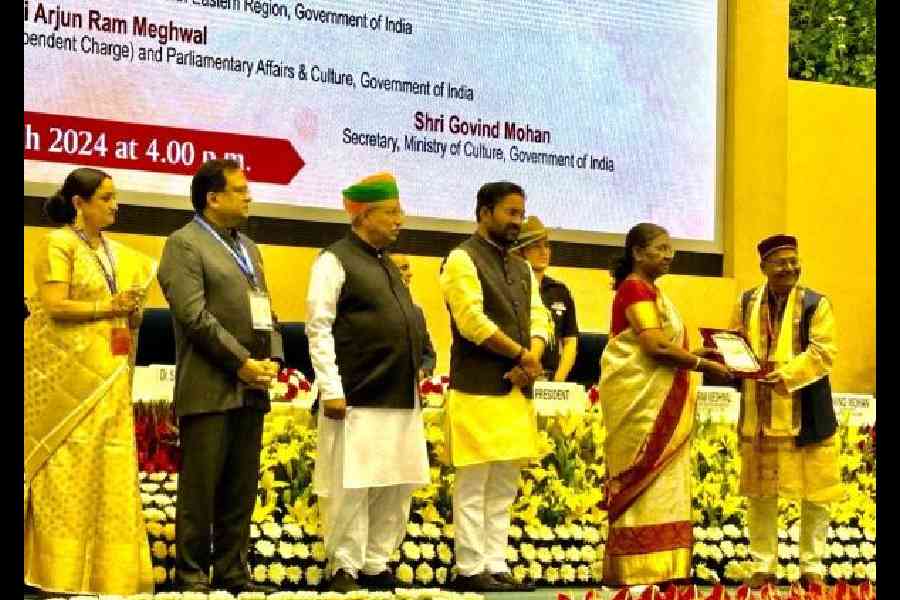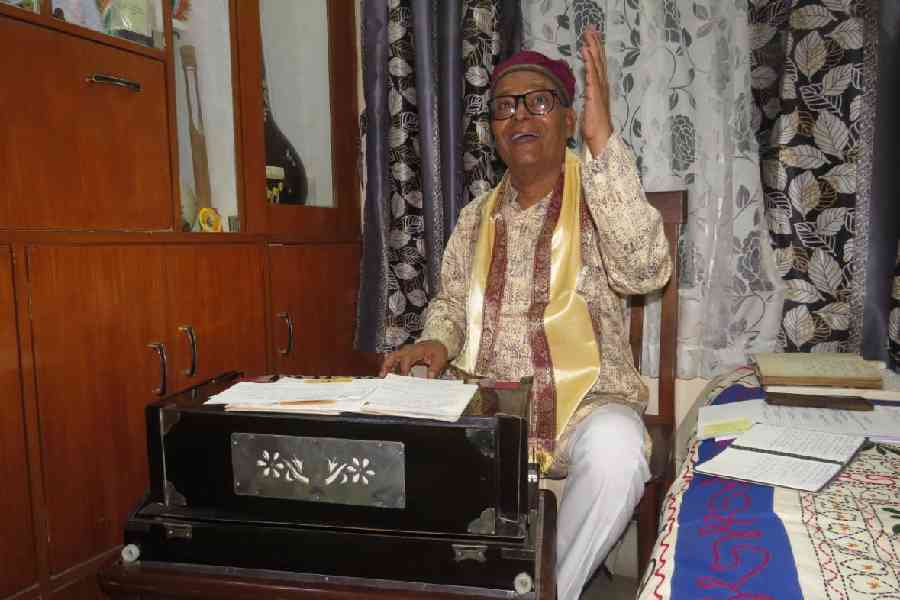Roaming from district to district and spending hours shadowing unknown folk artistes have resulted in a cupboard full of diaries with yellowing pages filled with lyrics in a variety of dialects and an awe-inspiring repertoire of songs over the years. Now New Town resident Swapan Mukhopadhyay has received the greatest prize yet for his tenacity — an Akademi Puraskar. The award, also called Sangeet Natak Akademi Awards, is granted by Sangeet Natak Akademi, the national academy of music, dance and drama under the ministry of culture. The award was handed over to the folk singer and researcher by the President on Wednesday at Vigyan Bhavan.
Walking into his AC Block apartment on the eve of his departure for Delhi to receive the award, The Telegraph Salt Lake was welcomed by the sound of dotara and harmonium being played. Mukhopadhyay was biding time the best way he knew — singing. “What you hear is gombhira, which is rooted in the Malda region. The name is an aspect of Shiva,” he smiled, pausing between verses as his fingers played an interlude.
He went on to narrate how the musical form became a vehicle for the freedom struggle, tales of atrocities of indigo planters and zamindars, local gossip and the like. “It was a plaform for folk journalism.”
He broke into a song addressed to Shiva in the course of the conversation: “O Bhola, Swaraj jodi paai, khate dibe malik kola, noile aytho kola …” The song is on Shiva being promised the more expensive seedless variety of banana as an offering if Self-rule could be obtained, in adherence to Mahatma Gandhi’s call. The song goes on to speak about the situation when “Baniya (traders, indicating the East India Company) hoilo dyashpoti (ruler of the land) - knach diya kanchonadi nyay (hands us glass in exchange for gold).

Mukhopadhyay receives the Akademi award from President Droupadi Murmu at Vigyan Bhavan on Wednesday
It is said that the format of complaining to Shiva through gombhira songs was recent and originated in a real-life incident. Sir Asutosh Mookerjee, then the vice-chancellor of Calcutta University, was supposed to come to the town which was the corridor to East Bengal in undivided Bengal. Quoting from his book Gombhirar Ateet O Bortoman, Mukhopadhyay relates an anecdote he had heard from the octogenarian artist Biswanth Pandit, now deceased, of how a programme had been arranged in Mookerjee’s honour with the gombhira singer Sufi Master scheduled to sing. When he did not come, the ingenuous artist composed a song drawing on Asutosh being another name for Shiva. So the songs meant to report local problems to the “tiger of Bengal” were instead addressed to an actor dressed as Shiva.
This became one of the five phases of a gombhira song, called charyaari, where four friends sing of different points of view on a problem. In the fifth phase, called samadhan, one of them comes up with a resolution.
“After the Partition, what Hindus called Bhola here started being replaced with the word Nana across the border by Muslim singers, with the rest being sung as it was barring slight changes in tune. Religion is never a problem in sharing music,” he pointed out.
Mukhopadhyay is full of such tales as well as tales of his own travels and travails in search of such tales. As a youngster, he used to accompany Arya Chowdhury, an All India Radio staffer whom he calls his guide, on village trips. A programme called Zilla Betar was starting and songs of artistes from the districts needed to be recorded on spool recorders. “We were driving to Suri when the sun set. The road was through the Kanksa forests, which was infested with dacoits. Suddenly our driver spotted some muscular men from a distance, switched off the headlights, and tore through the stretch in the dark on sheer intuition at breakneck speed. Behind our back, we could hear furious exclamations about us slipping through,” he laughed.
He embarked on this drive to collect folk songs from living sources when he was barely in his teens. “My parents were kirtan singers. My father, a priest at the Tarakeshwar temple, used to sing in Trinather Mela. My mother would sing bhaoyaiya at home. She bought me a small harmonium on which my training started.”
He graduated in commerce but did not enjoy the subject. So for Masters, he enrolled in Rabindra Bharati University which had a performing arts department. Here he came in touch with folk singer Nirmalendu Chowdhury, the head of the department, who took him under his wing and set him on the course of folk songs.
“It is fascinating how our dialects change every 10 miles or so in rural Bengal,” he reflected, “yet traditions are shared”. So the five-day puja of Shiva that would take place around Neelshashthi would be called Gombhira in Malda, Gomira in Jalpaiguri, Sahipuja in Odisha, Gajon in the Rarh area, the western bank of the Ganga, and Neelpuja in the Hindu pockets of Bangladesh.
It is only on scouring huts and fairs of Rarh Bengal that he came to know of the variety in jhumur. “There is pata-nacher or saheli jhumur in which girls make friends, tnar jhumur referring to scorched earth, bosekhi jhumur sung in Baisakh, baithaki jhumur, often composed instantly at meetings, and gorukhutuni or goth jhumur for the select days of the year when cattle are pampered and worshipped.
Mukhopadhyay said he started searching for songs on realising that unlike Tagore or Nazrul songs, folk songs had no collection that was available in print.
Notes beyond Bengal
Other than rural Bengal, music has taken him to Mumbai and Delhi. “In the late 70s, I started to sing in concerts at Shivaji Park and got to know Ashok Kumar and Kishor Kumar. In the mid-80s, I was asked to train Dilraj Kaur, who would sing in a bilingual film Kahani Phoolan Ki. I used to stay at composer Ravindra Jain’s house. Gauriprasanna Majumdar, who had introduced me, would write the lyrics for the Bengali version. But such was the public uproar about glorifying a real dacoit that the name had to be changed. Since the Bengali posters were already printed, the letter n was crossed out to make it Phul Devi.”
What could have been a turning point in his career was a concert in Delhi where the local Bengalis forced the organisers to extend his timing. In the audience was T-Series boss Gulshan Kumar who asked him to come to his office. Mukhopadhyay had no idea who he was and was awestruck on seeing the cassette-manufacturing factory. “He praised me profusely and handed me a blank cheque, asking me to join his company. After some thought, I asked for Rs 50,000 for my first cassette which he laughingly agreed to.” But Kumar was gunned down a few months after the recording, ending Mukhopadhyay’s aspirations.
He settled in New Town in 2013, when there were few buses to take him to Akashvani Bhavan or Doordarshan where he is a top-grade artist. “Communication has improved now.” He was also the cultural secretary of the block for two years and organised chhou, baul and mime performances during Durga puja. “My neighbours have heard me sing as well.”
Three of his manuscripts, on Bengal’s baul music and folk musical instruments as also bhaoaiya-chotka songs, are in press.
“This journey is over 50 years old. Today my award is dedicated to those unknown singers who kept the flame burning though they earned little from their art, sometimes not even two square meals a day,” said the 70-year-old.
What’s your message for
Swapan Mukhopadhyay? Write to saltlake@abp.in
